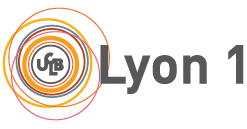Master Sciences de l'Océan, de l'Atmosphère et du Climat (SOAC)
Web: http://master-soac.univ-lyon1.fr
Mail responsible for M1 SOAC: alain.miffre@univ-lyon1.fr
Mail responsible Mention SOAC: patrick.rairoux@univ-lyon1.fr
To the attention of students currently in their L3 year:
If you have any of the following questions:
- What jobs (research, engineering) are offered by this Master?
- What are the selection criteria?
- Is this training adapted to my career path?
Or simply if you want to act through science to save our planet,
you are cordially invited to register for the Open House afternoon that we are organising for you on :
Thursday 9 March at 4pm, in person or by distance learning.
You will be able to talk to the teaching staff and students and ask any questions you may have about our course. Registration is compulsory (for practical reasons) from our website.
The Master SOAC (Sciences of Oceans, Atmosphere and Climate) is a Master carried by the University Lyon 1 (Physics Department, Chemistry Department) in co-accreditation with the Ecole Centrale Lyon, intended to meet the current and future needs for competent students in Sciences of Oceans, Atmosphere and Climate. Following a common M1SOAC year, the student chooses at the end of the M1 year his or her M2 pathway: Ocean Sciences pathway, Atmospheric Sciences pathway, Climate Sciences pathway.
1. The Master is co-accredited by the University of Lyon 1 (Physics Department, Chemistry Department) and the Ecole Centrale Lyon in order to enable students to acquire a triple skill set: Physics, Chemistry, Engineering, which can be used on the job market.
2. Three complementary courses are offered in M2 SOAC following a common M1 SOAC year:
- Atmospheric Sciences
- Climate Sciences course
- Water and Ocean Sciences course
Possibility of following each of these three courses in initial training, continuing education, or alternating training (by professionalisation and apprenticeship).
Possibility of personalising your course by choosing an opening (M1) and options (within the three M2 courses)
The choice of M2 course is made at the end of the M1 year (May).
3. International mobility on the 5 continents:
Possibility of semester or year abroad (M1, M2), internships abroad (M1, M2), hosting foreign students, courses in English, TD in Franglais.
4. Importance given to experimental practice and digital programming in teaching:
100h in M1 year. Master Project M1 (4 months), Master Project M2 (6 months), team work.
5. Network of over 250 former students who offer internships (M1, M2) and hire.













